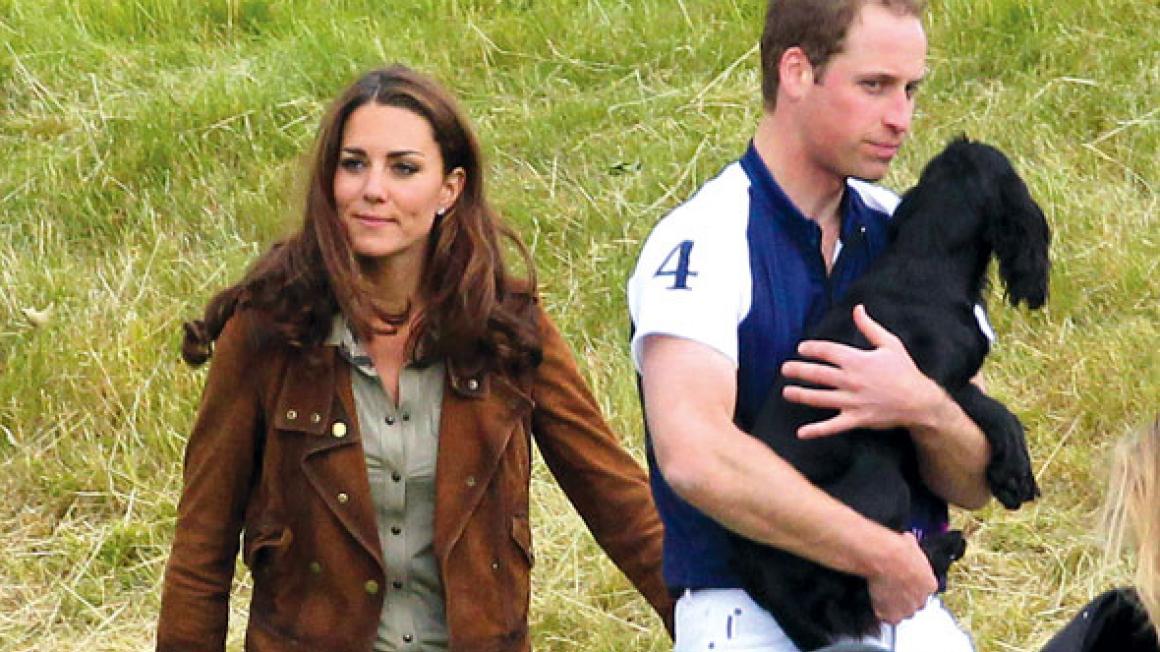And what about Lupo..?
The Duke and Duchess of Cambridge welcomed a dashing cocker spaniel, Lupo, into their family last autumn. And with the arrival of the Royal baby boy, Lupo will not only have to compete for his owners’ time and attention, he will also have to become accustomed to a strange (and probably rather noisy) housemate.
Fortunately, there are several easy steps that all parents can take to ensure the transition is as smooth as possible, and that baby, parents and pooch are content throughout…
WHILE PREGNANT
Basic training This is hugely important. Master simple commands such as ‘sit’ and ‘stay’, and make sure your dog can walk well on a leash so that it’s easy to control your pet when you also have a pram in tow. Now is the time to iron out any behavioural issues, too. Warning signs such as growling, snapping or lunging are cause to seek help from a professional.Introduce your pet to children Socialise your dog around children by taking them to the park, or arranging trips with friends with small children. It has been found that even playing episodes of programmes such as One Born Every Minute can help pets become accustomed to the sound of children crying.
Start stroking-training Children have scant restraint when it comes to getting to know other creatures. Areas such as the inside of ears and the underside of paws, which have until now seen little attention, will suddenly be investigated by little hands. Enable your pet to be comfortable with this by practising a few times a day for up to five minutes. Stroke these areas gently, and he will learn not to be startled by it. What’s more, if you do it during mealtimes or play, he will learn to associate it with pleasure.
Show a little less attention It is natural to want to dote on your pet in the months before the baby arrives, but this can lead to feelings of jealousy once your new bundle of joy is in residence. Instead, get your pet used to the idea that he is not the centre of your world (or at least your home). Never ignore him completely, but slow your reaction times so that he knows he may have to wait for attention. When it comes to nappy-changing time, a patient pet will pay dividends.
Lay out boundaries It is likely that you won’t want your dog wandering into your child’s room unheeded. If he has been allowed to roam freely around your house, start setting limitations so that he doesn’t associate resentment of the new rules with your baby.
Create a special spot Make a place in your home – a particular corner or basket – in which your pet won’t be disturbed. Fill it with blankets and toys, so he comes to view it as a comforting space to which he can retreat if necessary. Just as your pet has rules as to where he can go, it is also important that you teach your child early on that this space is a no-go. Your pet needs to feel that it is his special area.
JUST BEFORE THE BIRTH
Allow your pet to satisfy his curiosity A little person invariably brings lots of paraphernalia, such as car seats, prams and toys. Consider leaving these out so that your pet can become familiar with them before the baby arrives. He can sniff and lick them to his heart’s content and learn to accept them as part of his new environment. You are left with plenty of time to clean them so that they are baby-ready.Practice with a doll You might feel a tad silly, but acting out activities that you will regularly be engaging in – feeding, carrying and rocking – will help teach your dog appropriate behaviour. He will quickly realise that the doll is not real, but it will encourage him to be gentle (and not jump up or bark loudly) when you’re holding the baby in your arms.
WHEN THE BABY ARRIVES
Bring home blankets Before Mum arrives home with the brand-new baby, have either Dad or another family member or friend bring home blankets or clothes with the baby’s scent ahead of time. Don’t force them upon your pet (certainly don’t put them in his special place) but leave them out so he can become accustomed to the smell and investigate at his will. That way, when the baby comes home, he will already have started familiarising.Engage your pet when the baby is present It can be tempting to shower your pet with attention while your baby is sleeping, but this can breed resentment as your pet will come to associate aff ection with the absence of the baby. Instead, make a point of engaging your pet when your baby is awake and active, too – talk to your pet during feeding, for instance. This helps the bonding experience and reassures your pet that he is still very much part of the clan. He will associate good times and aff ection with the baby being present, and will soon learn to love the newest member of your family.


